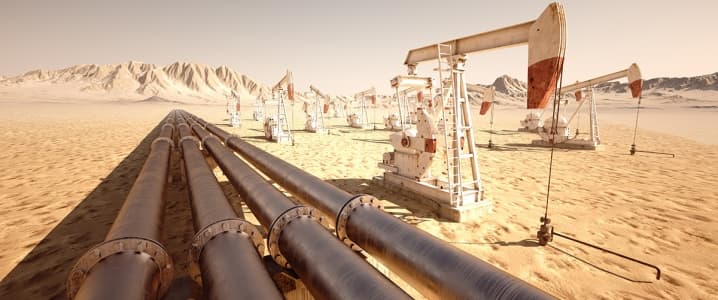Production from the Kirkuk fields in northern Iraq were briefly disrupted on Thursday, when Kurdish protestors seized a pumping station in order to protest the policies of Baghdad and Erbil, the capital of the autonomous Kurdish area in northern Iraq. The protest was allegedly inspired by Kurdish demands that Baghdad authorize the construction of a refinery in Kirkuk, and they shut down a line shipping oil to Turkey. Kirkuk fields were producing 120,000 bpd before the incident temporarily shutdown operations.
The Kurdish forces allowed pumping to resume after several hours, but they have reportedly not departed the scene. Kirkuk, which is largely outside the Kurdish area, has been under partial Kurdish occupation since 2014, when Kurdish Peshmerga retook the city from the Islamic State.
The incident highlights the growing rift forming between the Iraqi government and the Kurdish Regional Government (KRG), over how to best exploit the county’s oil resources. Much of those resources, particularly those available for immediate production and transportation, are located in Kurdish areas. The partial disintegration of the Iraqi state since the rise of Islamic State in 2014, which saw Iraq lose around a third of its territory to IS forces, has both pressured the Kurds while heightening their de facto independence from Baghdad. Related: Oil Prices Find Support As OPEC Compliance Nears 100%
A precarious balance now exists in Kirkuk, where the North Oil Company (NOC) run by the Iraqi government manages the oil fields
Iraq, which possesses 143 billion barrels and produces around 3.5 million bpd, has struggled for decades to regain production rates and market position. Since the 2003 U.S. invasion and the toppling of Saddam Hussein, Iraq has effectively been split into two rival states: the national authority in Baghdad and the KRG, which has negotiated agreements with international oil companies and driven the bulk of the country’s energy exports. How the revenues from Kurdish oil are spent has been a major point of contention between Erbil and Baghdad, and a revenue-sharing deal was scrapped last year after acrimonious debate: instead, Kurdistan and Iraq share output and export crude jointly.
Despite its avowed adherence to the OPEC production cuts, Iraq’s overall production went up by 1 percent in February, reaching 3.85 million bpd, with the bulk of the new production coming from the Kurdish area, where total oil sales increased by 9 percent, according to Bloomberg.
The Kurdish minister for natural resources told Reuters that the Iraqi government was shipping out oil from Kirkuk, around 40-50,000 bpd, rather than sending it to a refinery, thus easing Iraq’s compliance with OPEC agreements. Related: Saudis Cut Light Crude Prices To Asia To Keep Market Share
The war against Islamic State, along with a host of domestic problems, has placed economic pressure on the Kurdish government, pressure which it seeks to alleviate through new oil agreements. Once such deal, with Russian state oil company Rosneft, was signed in February and raised about $3 billion for the Kurdish government. Baghdad has threatened to sue companies or governments that make agreements with the Kurdish government, arguing that Iraq possesses sovereign control over its natural resources. Pressure from Iraq has weakened, however, due to the reliance on Kurdish support in the war against Islamic State.
The question going forward is; what will happen when Islamic State in Iraq is finally defeated, an outcome which seems likely as Iraqi, Kurdish and international forces slowly retake Mosul, the last major city under IS control.
When that happens, disputes between the Kurds, who desire greater economic and political independence from Baghdad, and the Iraq central government which desperately needs oil to rebuild the shattered nation, will likely grow more vigorous and potentially violent. Throw in Iraq’s somewhat dubious degree of compliance with the OPEC production agreement, it’s almost-total degree of dependence on oil revenues to maintain its struggling economy and state finances, and the chances of rising tensions appears high, with the Kirkuk oil fields emerging as a key prize for either Baghdad or Erbil to claim.
ADVERTISEMENT
By Gregory Brew for Oilprice.com
More Top Reads From Oilprice.com:
- Exxon Betting Big On U.S. Shale
- Oil Prices Rise On OPEC Compliance Data And Plunging Dollar
- Oil Rig Count Hits A 17-Month High

















